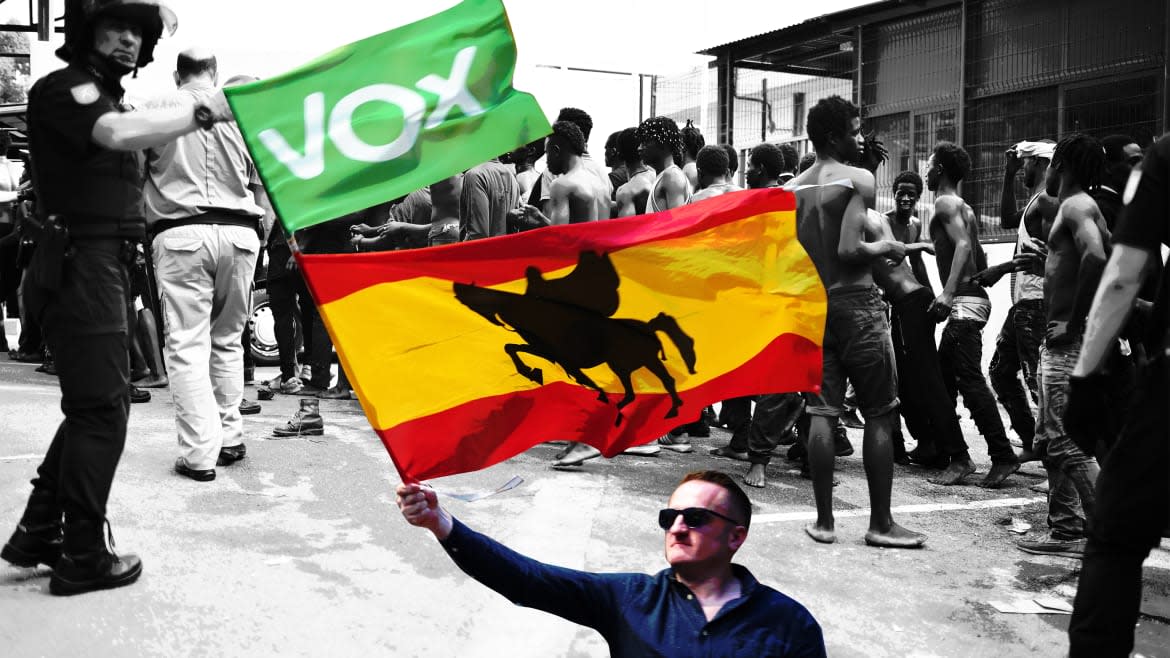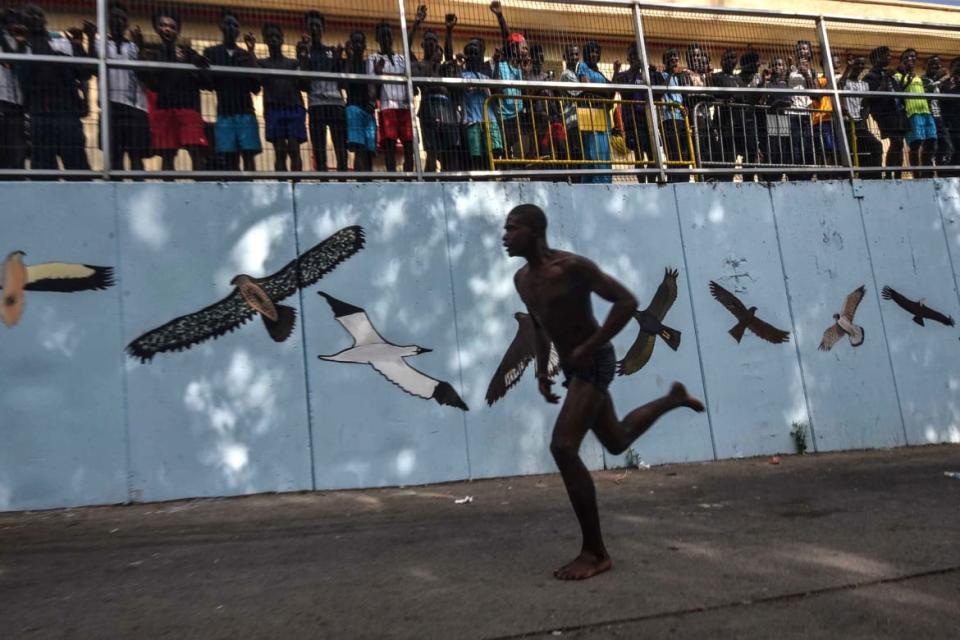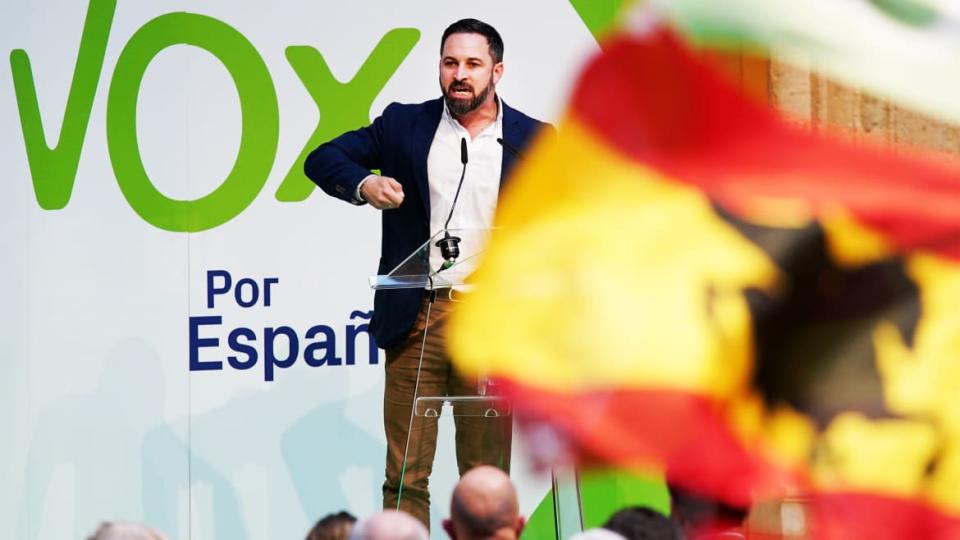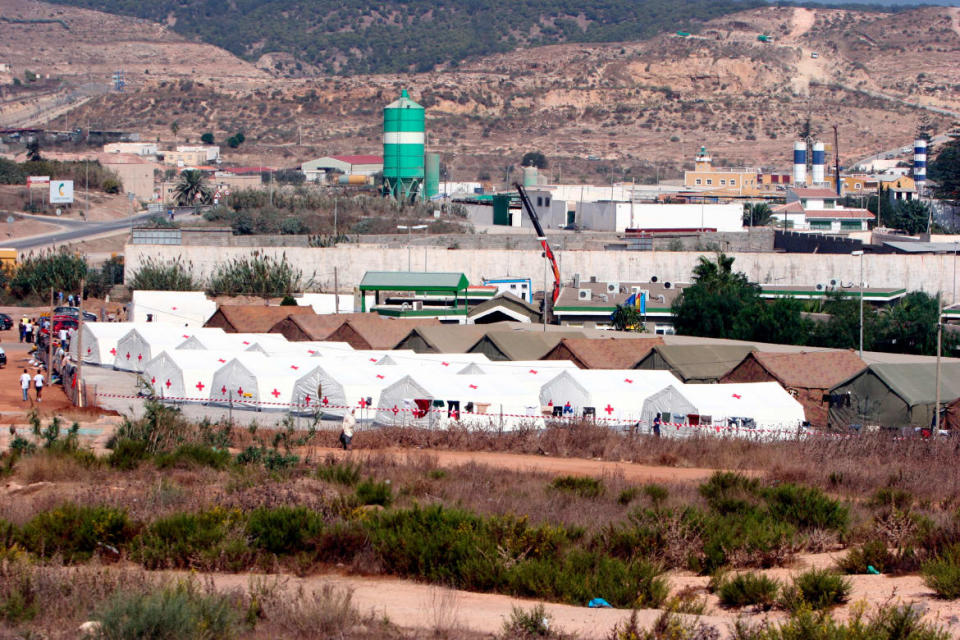Far-Right Party Gains in Spain as Migrants Flood Its Backdoor Entrance to Europe

STRAIT OF GIBRALTAR—The Rock disappears in the mist as Africa slowly emerges before us. To our right, Jebel Musa looms, one of two contenders for the southern Pillar of Hercules. Jebel Musa is in Morocco, though it is not to Morocco that we’re heading. It is rather to the Spanish enclave of Ceuta, above which, faintly discernible now, the Spanish and European flags wave listlessly.
Along with Melilla, another enclave several hundred kilometers to the east, this autonomous city, Spanish since 1668, remains the only patch of European soil on the African continent. As such, it has become a magnet for migrants, mostly from West Africa, who arrive at its fortified border with Morocco with visions of Europe dancing in their heads.
As is the case elsewhere in Europe, such immigration has become increasingly contentious. After running on an anti-immigration platform recalling those of Donald Trump and Europe’s various nativist groups, Spain’s newest far-right party, Vox, is expected to win a sizeable share of the vote in this weekend’s general election. Ceuta and Melilla have loomed large in the party’s campaign. The trials and tribulations of the migrants themselves have unsurprisingly gone overlooked.
Though doubtless less perilous than the maritime route—a deadly trek through the Sahara and war-torn Libya onto boats destined for Italy and Malta and the bottom of the Mediterranean—Spain’s land borders with Africa are not without their risks. The Ceuta-Melilla route runs through Algeria and Morocco, where sub-Saharan Africans are loathed and police brutality against them is rampant, and attempts to storm the razor-wire fences are put down ferociously, with long odds of success.
CEUTA

A man runs after over 100 migrants forced their way into the Spanish territory of Ceuta on August 22, 2018. - The migrants made their way into Ceuta after storming a barbed-wire border fence with Morocco and attacking police with caustic quicklime, a local official said.
Oumar Sibide is, he tells me, one of the lucky ones. The 18-year-old has been in Ceuta for five months, but on the road for the past two years. He left his family in Côte d’Ivoire when he was 16 and walked the nearly 5,000 kilometers north.
“Hundreds of us tried to get across,” he tells me when I ask about the border crossing. “Only some of us made it.”
We are sitting outside the Centro de Estancia Temporal de Inmigrantes (CETI), a refugee reception center in the forested hills to the west of the city. Sibide shows me the cross-hatched scars that adorn his hands, a grisly reminder of his run-in with the razor wire.
“It was a very frightening experience,” he says. “They didn’t want to let us across. The Moroccans tried to stop us and the Spanish tried to stop us. But the Spanish police are not as bad as the police in Morocco. If we had been caught there, we would have been beaten and sent to the desert. I have seen many people beaten.” (Both the Moroccan and Algerian governments have been accused of abandoning migrants in the Sahara.)
Dressed in a camouflage-print T-shirt and cargo pants, Sibide looks every bit his young age, his thousand-yard stare the only thing to suggest what he has been through since he left home. “I have talked to a counselor at the center,” he says, “but sometimes I still have nightmares.”
While he admits that he is an economic migrant—he left home to make money for his mother and siblings—it is difficult not to feel that, by this point in his travels, he has become a de facto asylum-seeker, too.
An estimated 57,250 irregular migrants arrived in Spain from North Africa in 2018, more than managed to do so over the previous several years combined. This represented nearly half of all Mediterranean arrivals to Europe last year. Indeed, while overall numbers of arrivals are down from their 2015-16 peak, the Moroccan-Spanish route experienced a surge in 2018, eclipsing the deadlier Libyan-Italian route, which continues to account for the vast majority of migrant deaths at sea.
I am reminded of Trump's "caravans," wending their way through Mexico. I am reminded of Australia's immigration "crisis," which has led to an irrational fear of "boat people" and one of the most draconian asylum seeker policies in the world. In terms of sheer numbers, neither crisis compares.
Europe’s changing political dynamics largely help to explain the boom in Spanish arrivals. When Italy’s right-wing government shut its ports to charity-run rescue boats last year, Spain’s center-left one, headed by Prime Minister Pedro Sánchez, proved willing to pick up the slack. In June, Spain agreed to accept migrants aboard the rescue ship Aquarius after it was turned away by Italy and Malta, while Spain's interior minister, Fernando Grande-Marlaska, has openly expressed a desire to remove the razor wire from Ceuta and Melilla’s fences.
In an interview with El País in August, the E.U. Commissioner for Migration, Dimitris Avramopoulos, praised the government’s “European spirit” while also issuing a warning against unfettered immigration. By accepting the Aquarius, he said, “I think Spain reacted in a very positive way. But it cannot go on this way.”
Ceuta’s majority-conservative leadership agrees, not entirely without good reason. Attempts on the fence are occurring with ever greater regularity— and, according to Guardia Civil officials, they are also occurring with ever greater violence. In late August, more than 100 migrants forced their way into Ceuta by throwing battery acid and quicklime at police.
For his part, Vox leader Santiago Abascal has explicitly channeled Trump by calling for an “insurmountable wall” along Ceuta and Melilla’s borders and arguing that Morocco should be made to pay for it. He has also said that the Spanish military should be given “the necessary orders” to defend the frontiers.

Candidate for prime minister for the Spanish far-right party Vox, Santiago Abascal gives a speech during a campaign rally in Burgos, northern Spain on April 14, 2019, ahead of the April 28 general elections. - On the margins until December when it burst onto the regional scene in Spain's south, far-right party Vox is hoping to get into the national parliament after the general elections by capitalising on lingering discontent.
On the Spanish side of the border, the migrants who manage to make it across are met with a system buckling under the pressure. Originally designed to accommodate 500 people, the Ceuta’s CETI is currently believed to be home to nearly twice that number.
Even the migrants themselves can sense that the Spanish government is being stretched thin. Fahad Abdallah, 30, is listening keenly to my conversation with Sibide, providing a kind of running commentary on the younger man’s answers. When Sibide says the situation at CETI is better than nothing—better, in any case, than the situation in Morocco—Abdallah, originally from the Comoros, laughs, and dismisses him out of hand.
“He’s only being polite,” he says. “The food is terrible. There are not enough beds. We are 10 people to a room. It is a living hell.”
Of course, Abdallah doesn’t have to stay here. The migrants are not required to do so. But the center provides its residents with jobs, however menial and poorly paid, and those who have recently arrived in the enclave want nothing more than to work.
Neither Sibide or Abdallah have any idea when, or even if, they will make it across the Strait of Gibraltar, but doing so remains the goal. Ceuta may technically be European, but it’s not the Europe they had in mind. They are only paid a few euros a day, but both are saving up for the crossing.
The question of money is one that preoccupies Omar Bah, 25, as well. Originally from Sierra Leone, Bah has been in Ceuta for a little under four months—“three months and twenty-two days,” he tells me—and works outside a supermarket in town, helping people with their groceries even when they don't need it.
“I make enough money to buy food and cigarettes,” he says. “I will never be able to afford the ferry. It took me nearly a month to save enough for a phone card. I had to call my mother.”
Wearing a yellow high-vis vest and a rapper cap that reads “DOPE,” Bah, too, walked from West Africa to Spain, traversing Mali and Algeria—assisted in the desert by smugglers, he says—before arriving in Morocco, where he lived in the forests around Jebel Musa for a little over a year. “We were alone out there but for God,” he says. He considers himself a political refugee, his father having been killed during Sierra Leone's civil war, which ended in 2002.
A group of Guardia Civil walk past and Bah shakes his head in wonder. “The police are so much better here,” he says. “We had to hide all the time in Morocco. We hid in the forest like animals. Because we have the registration card here, we can work. The police leave us alone.”
He hopes to eventually make it to the continent, where he says he’d like to find work as a mechanic—or, ideally, as a musician. “Music is my passion,” he says.
Our conversation is cut short when a woman emerges from the supermarket.
Apologizing to me as he does so, Bah goes into work mode. As he leaves, I ask how he hopes to get “over there.” “It isn’t easy, man,” he says. "It isn't easy."
A week later, 385 kilometers away, I find myself perched atop the ancient fort of Melilla, gazing down upon the city’s port with a group of young Algerians. It is midnight, and we are here to witness the nightly spectacle of young men taking the crossing into their own hands.
MELILLA

(GERMANY OUT) Spain, Melilla: Because of the high number of illegal African immigrants, the Red Cross put up this camp for the immigrants in the Centro de Estancia Temporal de Inmigrantes CETI in the spanish exclave
I am here for journalistic reasons and they are here for practical ones.
Kemel Moussati, 19, is all but taking notes. “It is important to see how it works,” he tells me. “You can get arrested if you’re not prepared.” Before attempting to stow away on the ferry to Almeria, it behooves one to get a sense of how it is done.
The demographics are slightly different in this smaller of the enclaves, with Algerians and other Arabs comprising a sizable portion of the migrant population. Many claim to be political refugees from Algeria’s long-entrenched ruling party, the National Liberation Front, across the border. Refugees from Syria, Palestine, Yemen and Lebanon are also represented, many of them applying for refugee status legally at the Office of Asylum and Refuge at the border. (Ceuta’s OAR, by contrast, isn’t operational.)
The border is an easy walk from the center of town, Melilla butting up close against its Moroccan neighbour, Beni Anar, on it southern side.
I walked out there this morning out of morbid curiosity. Unsurprisingly, the fence was a blight on the landscape, a scar through torn terrain ripping away to the west. A wasteland strewn with broken bottles rolled out on either side in its wake.
Predictably, the fence has proved as ineffectual at it has ugly: my companions this evening, all here illegally, easily found their way across. I can’t imagine Trump’s wall—or indeed the one Abascal imagines for this part of the world—stemming the flow in any meaningful way. There’s too much determination going around.
The show begins around one in the morning. A few young men, apparently on a late-night stroll, approach the fence surrounding the port and, individually and in pairs, deftly navigate the rolls of razor wire atop it, dropping nimbly to the other side. They continue their stroll as though nothing has happened, decidedly unhurried in their movements, and disappear from view.
For a long time, nothing much seems to happen. The only movement below is of passengers alighting from the late-night ferry along the enclosed walkway above the port. Then there is a flash of something from the direction of some shipping containers. Djamal Hosni, 20, raises a pointed finger in silence.
Bodies have begun darting between pillars and containers, timing their furtive appearances and disappearances with those of the ever-prowling police vehicles. Their target: the Baleària ferry, a high-speed, 82-meter-long passenger ship, and, more specifically, the ropes tethering it to land.
None of us speak, as though to do so might somehow jinx the operation, alerting the police to the migrants’ presence.
It is a cruel irony—a bad joke played by history and geography—that the countries hardest hit by the migration crisis should also be those hardest hit by the financial one, countries where unemployment remains in double digits on a good day.
The Europe of the migrants’ fantasies is, for the most part, precisely that: an illusion. One thinks of the continent’s ascendant far right, of parties like Italy’s The League and the Alternative for Germany, which are lying in wait to demonize and scapegoat them; of the knock-off handbags they’ll wind up slinging on Plaza Mayor and by the Trevi Fountain; of the accommodation, 12 or more to a room, they can expect to be granted upon making landfall; of the migrant ghettos to which they will likely be relegated on the outskirts of cities like Paris and Birmingham.
One knows—because one is not an idiot, however liberal one’s politics—that Europe cannot take on such numbers indefinitely. Not for cultural or demographic reasons, as cited by neo-Nazis and nativists, but because these countries’ systems cannot handle the load. An estimated 1.8 million irregular migrants have arrived in Europe since 2014. The continent's historical and moral responsibility as the beneficiary of colonialism is ultimately beside the point.
One doesn’t mention any of this to Moussati and Hosni, who are nervously smoking Moroccan kif as the drama below us continues to unfold, and not merely because to do so would be to break the spell of our silence.
For one thing, they already know, and want to try their luck in Europe anyway. “Anything,” Moussati will tell me later, “would be better than going home.” For another, it’s hard not to be on their side. Tonight, at least, the complexity of the situation, the sheer logistical magnitude of it, can be momentarily brushed to the side in the interest of the men on the ground. We all of us want those men to succeed, to appear all of a sudden in silhouette, shimmying up the rope.
None do. There are too many police cars, their timing too perfect. The Algerians are less disappointed than determined: Moussati insists they will do better tomorrow, when they attempt to board the boat themselves. All that remains is to see how the men escape the port, which, it occurs to me now, will be rather more difficult than getting into it was. But it is late, and we are tired, and we don’t stick around to see.

